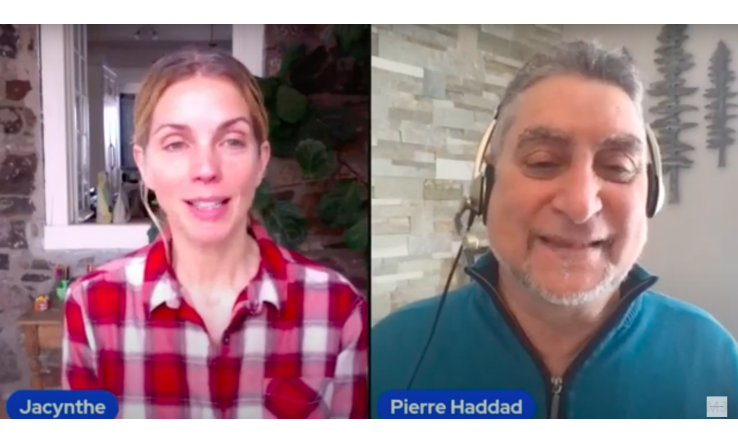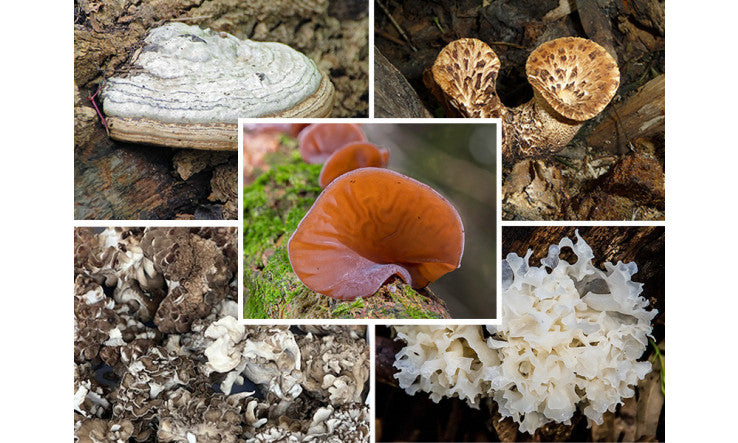Our meeting on February 23 with Pierre Haddad:
Topics discussed during this meeting and transcript of the remarks: *
2:00 - Is it possible to age healthily?
It takes a little effort!
In the life we lead today, it is all the more difficult and remarkable for those who manage to discipline themselves a little.
Food is the basis and a varied diet.
2:55 - Good Fats and Bad Fats
I explained a little about the difference between good fats and bad fats in the previous meeting ( here ).
3:06 - Fear of fat, often associated with danger and calories
It's the total calories we need to think about. So if we continue to eat sugar along with good fats, it won't necessarily give the desired results.
I thought of the analogy of gasoline in a car.
Since it's energy, it's like gasoline for a car, regular gasoline versus premium gasoline. The car's engine gets more clogged with regular gasoline than premium gasoline. It's certain that it requires an investment when we choose to put premium gasoline in our car.
So that's kind of what we can think of with good fats. It's like denser energy.
Good fats, such as polyunsaturates and omega-3s, will promote good metabolism in the body. However, if we don't reduce sugar at the same time, the effects on maintaining a healthy weight, for example, will be much more difficult to achieve.
It's not a magic recipe.
4:48 - So, is it sugars that should be blamed?
Actually, it's about fuel. So, if we get our body used to regular, well, it will burn regular! If we put more and more super, it will use fat as energy rather than sugar. And then, this will promote brown fat like the cold does, as well as all the other things you also recommend.
5:30 - How do good fats melt bad fats?
This trains the body to use fat as an energy source rather than sugars. In fact, it enhances brown fat, it promotes it and helps burn energy. This is what we call thermogenesis, fats that help maintain our body temperature and also generate energy.
In terms of quantity, it's not fat that we have the majority of in our bodies. On the contrary, it's quite limited. It's really training our body to use fats rather than sugars that will have beneficial effects. This has anti-inflammatory effects, protective for the cardiovascular system and for mental health as well. Omega-3s have been shown to help reduce depression.
So it's very good to incorporate good fats significantly into the diet.
7:30 - Satiety
This all makes sense. If we store energy, the excess is stored as fat. Thus, fat sends a message to the brain that we have a surplus of energy and therefore may not need to eat as much.
So there are satiety hormones that are produced by fats and that send signals to the brain.
However, just like insulin resistance, we can have resistance to "too many satiety signals." So, at some point, it works less well.
8:00 - Inflammation caused by fat accumulation
To pack on more fat, you either put more fat cells in or you let the fat cells swell, accumulating more fat on each of the cells in your adipose tissue. This tends to compress the blood vessels, suffocating the fat a little bit. And then the famous alarm signals are sent out, "there's something going on." So that's when the inflammatory system is triggered to try to control or counteract this perceived danger. This inflammation is what also contributes to insulin resistance.
10:15 - What can lower cholesterol?
Good fats help lower cholesterol, especially triglycerides. We often think of bad cholesterol, but triglycerides are also involved. Omega-3s are known to lower triglycerides. This is one of the factors in metabolic syndrome.
I mentioned earlier that you need at least 3 of the following factors:
- Abdominal obesity
- Blood pressure starting to rise
- Blood sugar starting to rise
- Rising triglycerides
- Good cholesterol that tends to lower
Improving cholesterol reduces the risk of cardiovascular disease. This is why doctors prescribe a lot of statins (the drug that helps lower bad cholesterol) because it has a significant impact on the risk of cardiovascular disease, i.e., heart attacks, arteriosclerosis, etc.
11:30 - Will this drug (statin) solve the problem at the source?
Statins prevent the body from producing bad cholesterol, but they will not affect the rest of the metabolism.
By increasing the amount of good fats – omega-3s – in our diet, we will improve the overall metabolic state of the body.
12:15 - Intestinal flora
I read something interesting! Omega-3s also seem to improve intestinal flora.
What is intestinal flora? We have a colony of bacteria. In fact, there are more bacterial cells in our bodies than cells in our own bodies! It's impressive. There are some in the mouth, throughout the gastrointestinal system (fewer in the stomach but many in the intestine, the colon). There are some elsewhere too.
We call it symbiosis. We've evolved, we've adapted to provide a warm environment, to feed and shelter these bacteria. In return, they help with digestion because they can digest insoluble fiber, which we can't do because we don't have the same enzymes as these bacteria. So, symbiosis is a give-and-take: we shelter them and they help us! They also produce short-chain fatty acids that help control metabolism.
13:47 - The importance of a diverse microbiota
By diversifying our diet, we help good bacteria.
The bacteria we have in our gut train our immune system. It's certain that we will have a developed immune system in the gut since everything we ingest, including bad bacteria, will enter the intestine. Thus, our immune system is highly developed in the gut to protect.
Good bacteria help a little by always being a guardian for the gut's immune system.
With age, diversity deteriorates and the immune system also tends to decline.
It is therefore a good thing to move towards prebiotics (those which feed the good bacteria) and probiotics (external bacteria which we swallow with yogurt or other products).
3:00 PM - Fermented Foods and Good Bacteria
These are excellent sources of good bacteria in the diet: yogurts, fermented soy, sauerkraut, etc. Even salami, although it is not the best source of fat!! Indeed, there are good bacteria in some cold meats.
15:45 - Is the immune system that develops in our gut the same one that protects us?
Yes, it's a part!
We also have them in our lungs, of course. All the interfaces between the outside and the inside are entry points for pathogens (which we call bad bacteria, viruses, etc.). So we need to protect ourselves. We have an immune system, but also a lymphatic system.
16:30 - Why is our microbiota less healthy as we age?
In fact, it's our immune system that weakens over time. So, perhaps the tutor is failing to send the right signals to the immune system. I'm less familiar with the immune system...
There is a very close link between the insufficient diversity of our intestinal flora... so if we always eat the same things...
It's good to have a diversity of bacteria in our gut. Our immune system could become lazy if it always sees the same players in our gut.
18:28 - Link with inflammation and intestinal permeability
In addition to the cell membrane, bacteria have one more wall than we do. The components of this wall are recognized as foreign to our bodies, since we don't have one. They are lipopolysaccharides, mixtures of sugars and fats that form a wall around the cell. Our body recognizes this as a foreign body and will react with inflammation once again to protect itself and to destroy or get rid of it.
When the gut becomes more permeable with metabolic problems, more of these little bits of bacterial walls will make their way into the bloodstream. This wakes up the immune system, causes inflammation, and makes everything worse.
There is a growing link, and it is my colleagues at Laval University, at INAF (Institute of Nutrition and Functional Foods) who have contributed to this demonstration that a healthy intestine, a healthy microbiota, will greatly help to better manage metabolism in the body.
8:00 PM - What about polyphenols in all this?
The polyphenols that we ingest, there is a part that is digested because we don't always have the same enzymes as bacteria (as I mentioned earlier), and they produce small derivatives of the polyphenols. We don't have everything figured out yet, but we see that this plays an increasingly important role in helping manage metabolism and promoting healthy management of sugars and fats in the body.
22:45 - Are liver stones and gallbladder stones the same thing?
Yes! Actually, stones often develop in the bile, and bile is made by the liver. The liver is a bit like a sponge. There are small ducts that converge into a large duct that goes to the gallbladder. The gallbladder stores the bile, concentrates it, and adds more alkalinity to send it to the intestine afterward. Since that's where the bile is concentrated, that's where liver stones most often form, but they can form and lodge in different parts of what's called the biliary tree, so inside the liver. But it's much more common, whether in the pipes or in the gallbladder. Since it's part of the liver system, that's why we associate it.
24:00 - Fatty Liver Disease, Sugar and Fat
At the same time, if we don't reduce our sugar intake, it won't help our body.
Again, if you give us super and regular (the analogy given earlier with gasoline for the car), our body will get used to using regular and will favor it. Regular is sugar, if you will. Omega-3s, the super gasoline that clogs the body less and that will encourage, train, our body to use fats rather than sugars as energy sources.
In animals, we've found that it helps with weight loss. In humans, it's not clear, but it may help accelerate weight loss when you make significant dietary changes. It may also help with weight maintenance. The yo-yo effect is something we always hear about when people are trying to lose weight. Omega-3s seem to help maintain the weight we lose. But it's not a magic wand! Just taking 2 teaspoons or tablespoons of olive oil won't fix everything if we keep eating chocolate bars and McDonald's!
26:40 - What can we ask about our blood parameters from our health specialist?
Good and bad cholesterol. It's pretty standard when doing a health assessment to look at fats.
In fact, it's rare for doctors to order insulin itself. When it remains high during the compensation period, as I mentioned, the pancreas, when it responds to these sugar surges and tries to control them, can adapt for a long time and then produce more insulin to counter the insulin resistance. The body reacts less well to insulin, which means the pancreas will say, "Well, I'll put more in." When we do blood tests, we can detect this slightly higher insulin. This gives an indication that insulin resistance may be present. It's less common for us to ask for it.
There is glycated hemoglobin, HbA1c, which is a good indicator because sugar normally sticks to proteins at about 5%. It is a slightly oxidizing molecule that will attach itself a little to proteins, we always have some. We can use red blood cells. Hemoglobin is the protein that carries oxygen in the blood and there is some in red blood cells. Red blood cells have a lifespan of about 6 months. So, we can see blood sugar levels for 6 months. If we look at hemoglobin, how much glucose is stuck to hemoglobin, this gives a good indication of blood sugar levels, sugars in the blood for a good period of time, at least 3 or 4 months. This gives a good idea of the glucose level in our blood over a long period of time.
30:00 - Taking charge
People have children, they work, they're short on time. That's what all the things we hear and can get delivered to our homes are based on. The system, unfortunately, doesn't help us. Yes, we have to take charge, but it's not easy because everything is done to do the opposite, to make our lives easier, to give us things that taste good.
32:00 - Gallbladder removed, some explanations
It's not that bad. All it does is remove the buildup, the concentration of bile and then the "bile flush." Bile is like soap, it helps dissolve fats so we can better digest and absorb them. There is a hormone that is produced by the cells in the intestine that sends a message that there are fats in the intestine. This will make the gallbladder contract and then send a jet of bile to help digest the fats. This is what we lose when we have our gallbladder removed; bile continues to flow from the liver normally, but we lose that jet of bile when we eat which helps with digestion. Bile continues to be produced by the liver all the time.
It's certainly better to have it, but it's not a big deal. You can still live very well without a gallbladder.
34:30 - Good habits - the basics
Basically, medications are there, they are crutches because people have difficulty establishing healthy lifestyle habits.
We're fighting against our body's craving for sweets and fats. We're programmed to like them! The food industry, of course, will capitalize on this and give people what they want: something that tastes good, that's sweet, that's salty, that's rich and creamy. But there's a way to do it with good fats, and that's what I like about what you're proposing.
Just taking steps adds up. That's the wonderful thing about the system; 5 minutes a day is the equivalent of 35 minutes a week. Anything you do to move: going up/down the stairs, going for a walk outside, even cleaning the house (if you do it a little vigorously). It's very important.
* This live transcript is intended to help you easily find the topics that interest you and the information you are looking for. Maison Jacynthe disclaims all liability. All information contained on this page is not intended to replace justified allopathic treatment or to override the expertise of the medical profession. It is up to each individual to take charge of their own health, to inform themselves, and to make the necessary changes to improve their condition. Therapeutic supervision by a qualified health professional is obviously suggested.


































































Leave a comment